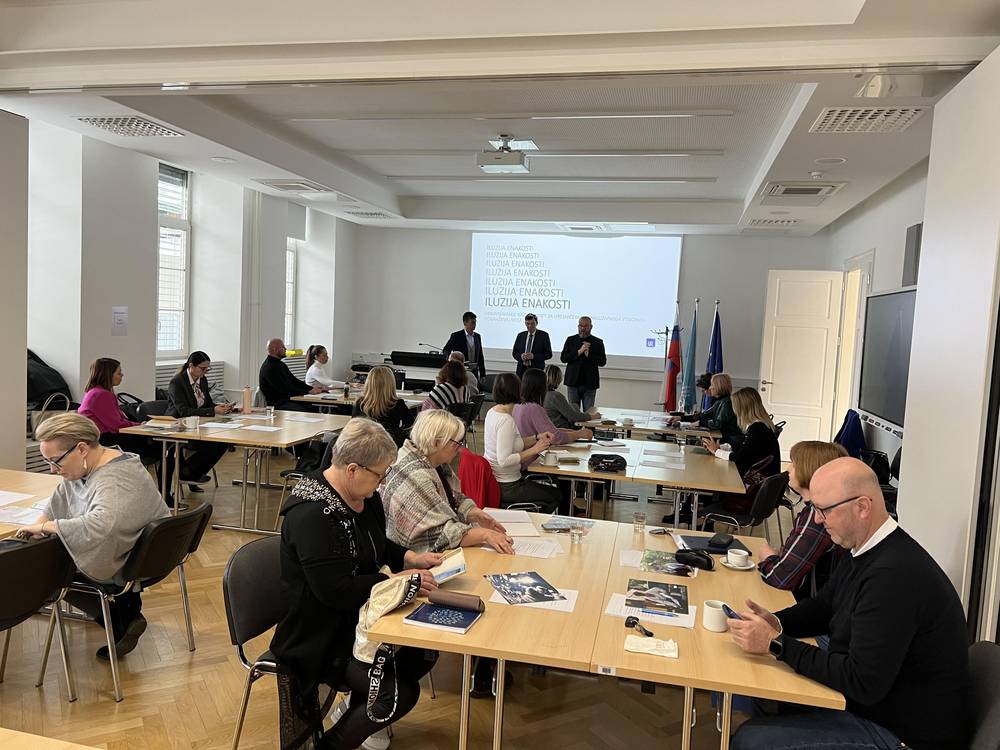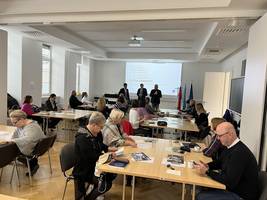At the meeting with principals on 21/02/2023, which took place in the premises of the National Education Institute of the Republic of Slovenia, the Human Rights Ombudsman, Peter Svetina, stressed the importance of education, which shapes a huge number of young people, and the challenges of leaders in educational institutions in the face of changing social conditions. He said that “Today, teachers no longer throw keys at children's heads, the awareness about children's rights is much greater than decades ago, but sadly it happens that some parents run rampant in schools with lawyers, and children vape freely in schools. You, the principals, face entirely different challenges than in the past. With the development of modern technology and pandemic events, these challenges have multiplied.”
He reminded that the rights of children are defined by numerous international documents, one of the most important ones is the Convention on the Rights of the Child, which were established as a result of the perception of the child as the independent holder of rights and no longer only as a member of a constitutionally protected family and a subject of protection and care. “Children are theoretically aware of their rights to a large extent, but the question arises as to what extent they know how to actually exercise them. And the question of whether they understand the responsibilities arising from the rights that belong to them. And of course, on the other hand, whether the state and all those who must train children to be active citizens know those responsibilities enough,” said Ombudsman Svetina.
He informed the principals that a special deputy is active with the Ombudsman only for the field of children’s rights, and in the Centre for Human Rights, rights awareness campaigns are raised. He emphasised that only educated children know how to exercise their rights responsibly and added that it is essential that they also know how to access the Human Rights Ombudsman as an alternative way to protect rights, where the role of teachers is of particular importance.
He also touched upon some of the challenges brought about by the pandemic, such as the problems of children and adolescents in terms of mental health and general well-being, as well as the lack of adequate professional support in taking care of their mental health. The Ombudsman criticised the inadequate recognition of the importance and impact of the education system on each generation by saying that “these are problems that will not be solved overnight, just as the problem with the lack of teachers, especially some with specific skills, or the imminent retirement of a large number of older teachers, and a solution with an appropriate evaluation of the pedagogical work is not in immediate sight either.”
He also warned that the practices of locking up schools, developed during the pandemic, despite caring for children and property, may become an illegal act of restricting freedom of movement without a legal basis or at least a court order. “By locking up schools, we can quickly interfere with the personal freedom of individual pupils. Therefore, in such cases, it would be worth considering about alternative security measures for the protection of children and property,” said the Ombudsman.
He focused mainly on the increase in peer violence and emphasised that in the event of a perceived potential threat to minors and anyone who needs special care, the only possible reaction in the school environment is a quick and effective reaction by the school authorities and then, if necessary, by the authorities. He also highlighted everyone's vigilance in such events and building trust in the school environment, also for a better flow of information. The Ombudsman encounters both good practices in managing events related to peer violence and cases where school management can't find a way to manage it. The Ombudsman was clear that “The first clear message must be: zero tolerance” and also highlighted the importance of unambiguous procedures and rules and preventive action with learning and education.
He also emphasised that only with knowledge and experience it is possible to build an inclusive space in which everyone has their place and in which they can contribute to the best of their abilities. At the system level, a change in the school paradigm is essential, which would redirect performance-oriented lessons to the acquisition of knowledge and skills for life, which, in the view of digital boom, is becoming more and more flexible. “We build an inclusive society also by providing the accessibility of institutions we run,” emphasised the Ombudsman and outlined the findings of the research carried out by the institution of the Ombudsman and on the basis of which a special report on the accessibility of centres for social work was made. "The adaptation of the school environment does not start and end only with facilities, but with people," said the Ombudsman and also touched upon the issues of assistance for children with special needs.
At the end he stated that the school must be a place where many young people can get what their families are not able to provide them with. He expressed trust in the work of principals, that schools with their staff become places where young people are able to learn about themselves and others, where rules of cooperation and inclusion apply, and where it is not important from what family you come from.


![[Translate to English:] Varuh predava ravnateljicam in ravnateljem o vključujoči šoli [Translate to English:] Varuh predava ravnateljicam in ravnateljem o vključujoči šoli](/fileadmin/_processed_/0/1/csm_Ravnatelji_21_2_2023_b_47624034a1.jpg)